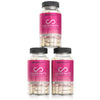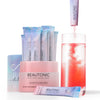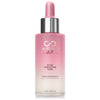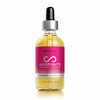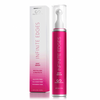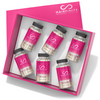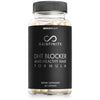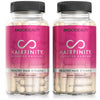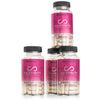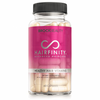
How to Style & Care for Your Hair Type
Hair is a significant part of people's appearance, and maintaining it effectively requires a lot of patience. This is because the way hair behaves is highly volatile. Predicting what your hair is going to look like when you wake up in the morning or after it has been through some sort of physical trauma is difficult.
That's why you need to pay close attention to how your hair responds to particular hair products, rainwater, heat, etc. The act of taking care of your hair may become daunting if you don't know its mannerisms well enough.
For example, whether you need a shampoo that provides extra moisture to your hair or a cleansing shampoo to get rid of any residual waste, the choice depends on the condition of your hair, the weather, the texture of your hair, the kind of products that work for them, etc.
Types of Hair
Learning how to take care of your hair and implementing that knowledge into a daily routine can be difficult. There can be various hurdles like lack of time, money, resources, etc. This is why today we will look at hair care systematically.
First, we will talk about different types of hair, and then we will move on to styling and caring for them. Let's get started.
The curl pattern of your hair is based on the shape of your hair follicle, which results in shapes such as straight, wavy, curly, and coily.
This means that if the follicles are relatively more oval and asymmetrical, your hair will grow out curly. The largest determining factor of your hair type is genetics. The natural curl pattern of your hair can be altered with heat and chemicals.
Furthermore, changes in your curl pattern may also result from certain hormones or medications you consume. This is to say that your curl pattern is embedded in your DNA, but it's noteworthy that the product of each growth cycle can vary according to factors like stress, hormonal imbalance, medication, etc.
Classification of Hair Types
There are broadly four different hair types, each defined by its general shape. Each hair type has three different subcategories to make the process of styling smoother for professional hair stylists.
Like any other classification, hair type classification also belongs on a spectrum. This means that hair with no natural curl belongs to one side of the spectrum and its complete opposite is the hair that's the curliest.
Type 1 - Straight Type 1hair is essentially straight, which means it has no waves or curls whatsoever. Caring for straight hair comes with quite a few challenges. Before we begin talking about how you can take care of your straight hair, let's have a look at its subcategories:
- First, we have Type 1A hair, which is usually straight as a stick. The strands are fine, and they lie flat on the scalp with no bends.
- Next, there's Type 1B hair, which is straight but has considerably more volume than 1A. Type 1B hair is not too thick and not too thin, and carries a very little amount of volume. It has little to no waves.
- Then comes Type 1C hair. Type 1C hair is thick and has noticeably more volume than other types of straight hair.
Type 2 - Wavy
Type 2 hair is generally wavy with a delicate and tousled texture. Much like straight hair, the classification of wavy hair is also segregated into three types:
- Type 2A hair is fine and wavy towards the ends rather than the roots. The strands are typically straight up to the eye level and fall into loose, undefined waves.
- Type 2B hair has more waves with slightly defined S-shape strands. Whether you want a more flattering cut or switch it up with color, it's easy to style however you want it.
- Type 2C hair is extremely wavy with well-defined S-shaped curls. It's thick and gets frizzy quicker than other wavy hair types, but it has a heavily wavy texture.
Type 3 - Curly
Type 3 hair has extremely loud and pronounced curls. They lose moisture very fast and are prone to looking frizzy after just a few minutes out in the air. There are three curl types:
- Type 3A curly hair are defined, but they have a loose pattern with S-shaped curls that form loops. They often lose definition towards the end, making them look thin and stringy.
- Type 3B has a similar texture to type 3A curls, but they are slightly tighter and have more definition. This type of curly hair is voluminous and requires a sizeable amount of moisture to maintain shape.
- Type 3C curly hair has closely formed S-shaped loops, giving them a refined, curly look.
Type 4 - Coily
Type 4 hair is curly that is shaped like coils. They are prone to shrinkage and frizz. Coily hair is of three types that may be confused with one another. They are:
- Type 4A hair is extremely delicate. These coils have a tight S-shaped curl that can easily wrap around a stick.
- Type 4B hair has a zig-zag shape. It needs a lot of moisturizing agents like deep conditioners and leave-ins even to begin to detangle the curls.
- Type 4C is the curliest type of coily, kinky hair possible. These curls are tight and need to be handled gently. A full head of type 4C hair looks round and voluminous.
Hair Care & Styling Tips for Straight, Wavy, Curly, and Coily Hair
As far as hair care goes, straight hair doesn't require much maintenance. People with straight hair have to follow a few basic rules to ensure their mane gets the nutrition and care it deserves. Let's have a look at how you can take care of straight hair.
Straight hair tends to become oily. Whether you have naturally straight hair or artificially straightened hair, it gets oily faster because the natural oils secreted from the scalp end up creating a strong coat on the hair. Use a cleansing shampoo that strips away any dirt that may be visible on the hair.
Straight hair is weighed down, so use a light conditioner. Moisture is good, but too much of it can lead to hair fall. This same principle needs to be followed while picking out serums and leave-in products. Heavy styling creams and thick serums are a no-go for straight hair.
Wash your hair whenever it feels too greasy and uncomfortable. If you don't want to use water, grab a refreshing dry shampoo.
Styling straight hair can feel tricky because of its dull nature. For example, if you want to curl your hair for a special event, the curls might not last long. Straight hair, especially fine straight hair, lacks volume. In that case, you can go for a chin-length blunt haircut that suits your face.
You can choose any haircut that may give an illusion of volume. Sit down with your hair stylist and discuss the problems you want to address so they can give you a flattering cut. Avoid heat-styling tools like curlers because they can damage your hair. Once in a blue moon is fine, but regular use can destroy the texture of your hair.
In the case of wavy hair, you must stay away from products with a high concentration of oil and cream. They can wear your hair down, causing it to lose its natural wave. Wavy hair frizzes up quickly, so make sure to keep it moisturized.
This is why you must avoid artificial treatments that alter the texture of your hair. If you want to add something to your after-wash ritual, go for a mousse or a gel.
In case you have colored or chemically treated hair, make sure to use color-friendly products. Using regular products or anti-dandruff products will strip away the color faster and lead to more frizz than you signed up for.
Styling wavy hair is perhaps the easiest thing to do for hair stylists. It has a natural wave, so it doesn't require a lot of product. Any haircut would look great on wavy hair because its natural wave does most of the work.
Whether you want to cut it short up to the chin or just add a few layers to it, wavy hair can rock almost any hairstyle. Speaking of hairstyles, coloring styles like balayage is a true head-turner for people with wavy hair.
Curly & Coily Hair
Taking care of curly hair is a daunting task, to say the least. It's unpredictable and gets frizzy too fast. It loses moisture at the drop of a hat, and you can't comb it dry without losing a heap of hair. Furthermore, it gets easily tangled, which is a pain to resolve.
So, how do you take care of it? The answer is moisture. The most constant source of care for curly hair is moisture. If it lacks moisture, it will be hell to manage.
Look for products that are created specifically for curly hair. The curly hair girl method dictates that in order to maintain the shape and quality of your curls, the products you choose to use must be free of parabens, sulfates, and silicones. This is because these chemicals are likely to destroy the texture of naturally curly hair.
Use products that add moisture to your hair. Conditioning your curly hair is a fool-proof way of maintaining the curl pattern. If you have curly hair, your hair care routine must include deep conditioners. Find a deep conditioner with nourishing oils and proteins like keratin, argan oil, Moroccan oil, and castor oil.
Make it a rule to deep condition your curly hair at least once a week. This is important because curly hair loses moisture faster than you would realize. Give your hair a deeper infusion of moisture with HAIRFINITY Strengthening Amino Masque, infused with relaxing scents of sea salt, hibiscus and essential oils. This amino hair treatment is proven to reduce breakage up to 90%.
After washing and conditioning your hair, don't towel dry it. Instead, let your hair air dry so that it's not dripping wet, but it shouldn't be completely dry either.
Apply a serum to wet hair to create a protective coating on your hair. This will seal the moisture in, and you can then proceed to use styling products like curl creams, volumizing gels, or sprays of your choice. Remember to make sure that the products are curl-friendly, and more specifically, they should suit your hair texture.
If you're in a rush and don't have time to air dry your hair, use a hair diffuser. But you can't use a diffuser on your hair directly because this will dry out your hair. Set the diffuser to low or medium heat and hold it 10-15 inches away from your hair. Minimize the time your hair spends under this heat.
Not to mention, try to steer clear from bleaching or coloring your curls at home. If you want to style your curls a certain way, find a salon with hair stylists who understand curls. Follow their instructions religiously.
Don't comb your hair when it's dry. Comb it in the shower while it's covered in conditioner. If you're using a good conditioner that adds enough moisture to your curls, like HAIRFINITY Balanced Moisture Conditioner, then the comb will slide through your hair easily. This will help take out the tangles without pain and struggle. Don't use a fine-tooth comb. Use a wide-tooth comb or a detangling brush.
If you have low-density curly hair, ask your stylist for a layering haircut. This will add volume to your hair.
Remember not to put your hair up in tight hairstyles. Anything that pulls your curls up from the root will damage the curl pattern.
To sum it up, many people go to extraordinary lengths to maintain the integrity of their hair. They go for regular spas, relaxing treatments, haircuts, expensive products, and much more. However, these treatments can be quite expensive, and more often than not, the hair bounces back to its original condition faster than you imagined.
Such an outcome can create a big hole in your pocket. Therefore, instead of opting for a permanent approach that has more chance of destroying your hair, it's better to indulge in healthy hair practices that will work out well in the long term.
More importantly, rock your natural hair because it's beautiful just the way it is.
















